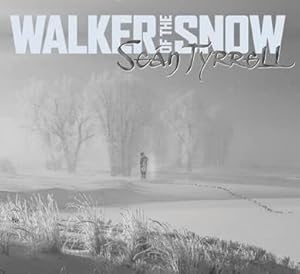|
Sean Tyrrell, Walker of the Snow (Vital, 2012) You couldn't call Sean Tyrrell prolific. Walker of the Snow is his sixth album since his first, 1994's Cry of a Dreamer, which garnered a fair amount of merited attention and a deserved award or two. As if to make up for all those silent spaces, Walker offers up something like 70 minutes, with 18 songs and tunes. Though the copyright date says 2012, it was released in the United States in August 2013.
Unusually, Tyrrell's instrument is not six-string acoustic guitar but variations on the mandolin (mandola, mandocello). Occasionally, he picks up tenor guitar or banjo. A small band in varying configurations and instruments (electric guitar, fiddle, bodhran, keyboards) backs him on most cuts. The song selection is eclectic, even eccentric: traditional Irish and American, revival compositions, poems set to Tyrrell's tunes, folk-like material from the unexpected likes of John Lennon ("Working Class Hero") and Gerry Goffin & Barry Mann ("Sad Gypsy"). He sings them in a rugged, unsparing, worn-down voice. Some choices appear at first gulp to be astonishingly banal. "You are My Sunshine"? "On Top of Old Smoky"? Tom Paxton's done-to-death "I Can't Help But Wonder Where I'm Bound"? Then you hear what Tyrrell does with them, which is to cut to their wrenching emotional cores and transform them in radically altered ways. Hearing "Smoky," I am reminded that it is almost the ur-American folk song, linked melodically and lyrically to a range of grand ballads including "The Wagoner's Lad" and "I'm a Rambler, I'm a Gambler." Tyrrell slows it down as if he has weighed each word and lived each line, as if looking down the same long, lonesome road the narrator has traveled, in flight from sorrows too terrible to be borne. In Tyrrell's treatment "Smoky" becomes not so much compliant as epic. "Sammy's Bar" will be familiar to any knowledgeable folknik. It's the sort of song that so unnerves consciousness that one is likely to recall when and where one first heard it. With me it was in 1971 at the Quiet Knight in Chicago, and the singer was Michael Cooney. The last time it passed through my speakers, it was courtesy of a fine Martin Simpson version. As unrelenting as any I've experienced, Tyrrell's reading startles with its bitterness, loss and bleak beauty. The late Cyril Tawney (who also wrote the classic "Grey Funnel Line") framed it as a shanty, with an almost literally unforgettable refrain whose meaning expands with each repetition. It is, however, a ballad relating an episode of sexual betrayal and its tragic consequence (for once, not murder). Its geographic references -- I was finally led to look them up -- set the events on Malta. The three principal characters, one presumes, are British ex-pats. Tawney's bare-bones lyrics explain no more than they have to. It's an extraordinary song, and Tyrrell's is a magnificent interpretation. The title piece takes its inspiration from a narrative poem by Charles Dawson Shanley, an Irishman who decades ago found himself on the Yukon frontier and imagined what might happen to a man lost in the snow on a frigid night. Tyrrell puts his own Irish-flavored melody to the narrative, to chilling effect, and I mean "chilling" in more than one sense. Shanley's lyrics are a natural for folk-ballad treatment, and indeed the first such was recorded in 1929 by Billie "The Cow Girl Singer" Maxwell. She called it "The Haunted Hunter," and it packs a punch. So, however, does Tyrrell's, with a very different melody and a far more ominous vocal. Like Laura Smith's Everything is Moving, which I reviewed here on 8 June 2013, Walker of the Snow is a demanding recording by an artist to whom commitment to a song is not lightly taken. The reward a listener attains by meeting such performers halfway is considerable. Walker won't change your life, but it will definitely enrich it. 

|
 Rambles.NET music review by Jerome Clark 12 October 2013 Agree? Disagree? Send us your opinions!  



 |

